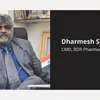What's in store for FMCG giant Rasna in the new normal after COVID-19?
Founded in 1976, Rasna manufactures and sells soft drink concentrates. It also ventured into other product categories, including honey and chyawanprash, and offers 65 SKUs.
For many of us, evokes pleasant memories of childhood, when during summer vacation, orange or mango-flavoured Rasna drink was always available in the fridge.
At the time, it felt like a chemistry class—to mix the different concentrates in the right amount to get the precise flavour—only the adults in the family were worthy to prepare it.
As we are slowly stepping out of the COVID-19 pandemic, businesses are betting on new strategies to grow in this new normal. Among them is one of India’s popular fast-moving consumer goods (FMCG) brands Rasna.
Piruz Khambatta, who currently leads the brand, says, “I think COVID-19 is now a pretty old story. My team and I have decided to not talk about it anymore.”
Prod him a little more on the challenges faced during COVID-19, and Piruz says, “Of course, there were challenges related to health, family, logistics, and then marketing,” adding that he is transfixed now on what’s ahead, especially globally.
Started in 1976 by Piruz’s grandfather Phirojshaw Khambatta, Rasna made and sold powdered concentrates at Rs 5 per box.
Famously drunk during summer to beat the heat and quench thirst, Rasna enjoyed a monopoly in India’s soft drink market until MNCs introduced aerated drinks such as Pepsi, Coca-Cola, Fanta, etc.
Piruz—a third-generation entrepreneur—joined the business in 1992, taking over the legacy business from his father Areez Khambatta.
In an interview with SMBStory, the Chairman of Rasna explains the FMCG company’s plans, his views on the direct-to-consumer (D2C) model, selling strategies, global plans, and more.
Growth story
According to ICRIER, the non-alcoholic beverages market is slated to reach Rs 1.4 lakh crore by 2030, growing at a CAGR of 8.7 percent.
Piruz claims Rasna is a healthier alternative to aerated drinks since the former contains 11 vitamins, whereas the latter is made up of sugar and flavours.
Despite this, Piruz says Rasna survived in the market for its easy-to-use and carry feature and price point. A typical Rasna pack costs Rs 48 that serves 32 glasses, while a 300ml Coca-Cola bottle would cost Rs 40.
At present, the brand also competes with Tang, Glucon-D, and handmade sharbat.
Rasna considers India’s metros as its top market. However, it witnesses more demand from places like Janakpuri (Delhi) and Dadar (Mumbai), instead of posh colonies like South Delhi or Bandra (Mumbai).
Starting with only orange flavour, today, Rasna counts 65 SKUs (stock-keeping units), including Alphonso mango, Kala Khatta, Kool Khus, etc., in its flavour portfolio.
Besides concentrates, it has also ventured into product categories like honey and chyawanprash.
According to Ministry of Corporate Affairs (MCA) documents accessed by SMBStory, the company’s revenue saw a sharp decline, clocking Rs 109 crore in FY21 compared to Rs 135 crore in FY20.

Why not a D2C model?
As brands are increasingly moving towards the D2C and ecommerce business models, Piruz expresses strong views on this online model. “There’s so much hype around the online model, but every online player in the country is losing money,” he says.
For the last two years, Rasna tried the ecommerce and D2C route by selling on its website and marketplaces like Amazon and Flipkart and made losses.
Adding that ecommerce is a money-burning business, Piruz says, “I am very happy with selling my products through the brick and mortar stores.” He is clear about not making Rasna an “ecommerce-led company.”
However, he continues, “I can still list my products on ecommerce platforms and can get real-time feedback on whether customers are liking them or not, which is not possible in offline stores.”
The global plans
At present, the FMCG brand is available in more than 53 countries across Europe, Middle East, Africa, and the US.
According to Piruz, the pandemic opened a myriad of opportunities for Indian businesses. In fact, the government’s thrust on domestic manufacturing boosted exports. In some cases, customers are finding better and cheaper products in India than in China, with the country seeing more exports.
He says, “When I entered the industry, people came to India when they wanted cheap products (in the FMCG space), but that’s not the case anymore.”
Rasna counts GCC countries and the African region as its top export markets and also sees demand from the South American markets, where one of its teams is working on the ground generating demand for several months.
According to the company's balance sheet accessed by SMBStory, Rasna's gross export turnover for FY21 was Rs 12 crore.
The way ahead
Rasna’s advertisements have always managed to catch the fancy of its customers. Piruz admits that about 15-18 percent of its yearly budget is allotted for marketing activities, which feature some of the top actors from Bollywood, including Akshay Kumar and Kareena Kapoor Khan.
This year, while Rasna has no actors collaborating with it, the Ahmedabad-based company has tied up with Paytm to offer cashback to women customers. It has also launched a TVC featuring Chota Bheem to resonate with kids.
Going forward, the company aims to sell products in India catering to various segments, including the urban and rural masses, modern trade, and ecommerce markets.
For instance, while Rasna will market its Rs 2 packet (3.5-gram sachet) of Jal Jeera flavour in rural markets, it will feature its combo packs on ecommerce platforms.
Similarly, it will sell its premium zipper packs both in modern trade and ecommerce marketplace. Moreover, the renewed interest among consumers wanting to take better care of their health will boost sales of Rasna in the coming times, Piruz says.
(This story was updated to correct a typo)
Edited by Suman Singh









